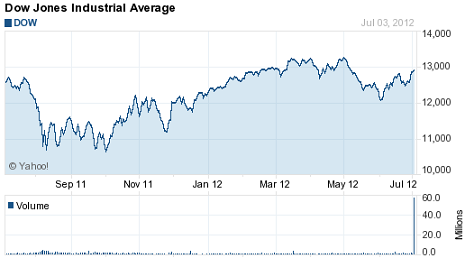Google Breakup: A Real Possibility And Its Implications

Table of Contents
The Case for a Google Breakup
The debate surrounding a Google breakup centers on whether its immense market power harms competition and innovation. Many argue that Google’s dominance constitutes a monopoly, necessitating regulatory intervention to promote a fairer and more competitive digital market.
Monopolistic Practices
Google holds a commanding market share across several key sectors. In search, Google’s dominance is near-total, holding over 90% of the market in many regions. This extends to online advertising, where Google’s AdSense and AdWords platforms control a massive portion of the market. Android, Google's mobile operating system, further solidifies its power, powering the vast majority of smartphones globally. This dominance raises serious concerns about monopolistic practices.
Evidence of anti-competitive practices includes:
- Pre-installation of Google apps on Android devices: This gives Google apps an unfair advantage over competitors, limiting consumer choice and hindering the growth of alternative apps.
- Preferential treatment of Google services in search results: Google's search algorithm allegedly prioritizes its own services, pushing down competitors and making it difficult for smaller businesses to compete effectively. This practice, known as "self-preferencing," is a key area of concern for antitrust regulators.
- Strategic acquisitions: Google’s acquisition of numerous promising startups has been criticized for stifling potential competitors before they can become significant threats.
Ongoing legal battles and regulatory investigations across multiple jurisdictions highlight the gravity of these concerns. The EU, for example, has already levied significant fines against Google for anti-competitive practices.
Stifling Innovation
Google's dominance significantly hinders innovation. Smaller companies struggle to compete effectively, lacking the resources and market access to challenge Google's established platforms. This creates a "winner-takes-all" scenario, limiting the diversity of products and services available to consumers.
- Limited alternatives: The lack of viable alternatives in search, mobile operating systems, and online advertising restricts consumer choice and innovation.
- Fear of retaliation: Smaller companies may hesitate to develop innovative products or services that directly compete with Google, fearing retaliatory actions from the tech giant.
Examples of innovative companies potentially stifled by Google’s market power are numerous, and often remain hidden due to the difficulty of competing openly with such a powerful entity.
Data Privacy Concerns
Google collects vast amounts of user data, tracking online behavior across its various products and services. This extensive data collection raises serious privacy concerns. The argument for a Google breakup often connects data privacy concerns with antitrust arguments, suggesting that Google’s unparalleled control over information grants it undue power and influence.
- Data misuse: The potential for misuse of this data, including targeted advertising, profiling, and even political manipulation, is a major concern for users and regulators alike.
- Lack of transparency: The lack of transparency regarding Google's data collection practices further exacerbates these concerns.
Potential Implications of a Google Breakup
A Google breakup could have profound implications for consumers, businesses, and the broader tech landscape. While a more competitive market offers potential benefits, the transition could also pose challenges.
Impact on Consumers
A breakup could lead to several changes:
- Search results: Search results might become more diverse, reflecting a broader range of perspectives and information sources.
- Advertising: The advertising market could become more competitive, potentially leading to lower prices or more targeted advertising options.
- App availability: Consumers might have access to a wider variety of apps and services as the dominance of the Google Play Store is potentially reduced.
However, the transition could also initially disrupt services, and consumer experience might be temporarily impacted as the new market dynamics stabilize.
Impact on Businesses
Businesses heavily reliant on Google services for advertising, search, and other operations would face significant adjustments.
- Advertising: Businesses relying heavily on Google Ads might need to adapt their marketing strategies to reach customers through alternative channels.
- Search optimization: SEO strategies might require substantial changes as search algorithms potentially shift.
- Increased competition: A breakup could create opportunities for smaller businesses to thrive in a more competitive landscape.
However, some businesses might initially struggle to adapt to the new competitive environment.
Impact on the Tech Landscape
A Google breakup could fundamentally reshape the tech landscape:
- Increased innovation: The breakup could foster a more dynamic and innovative tech industry with more diverse products and services.
- New market entrants: It could create opportunities for new companies to enter and compete in previously dominated markets.
- New market dynamics: The power dynamics in the tech industry could significantly shift, potentially leading to new alliances and collaborations.
However, a fragmented Google might initially struggle to provide the same level of seamless integration that its current structure allows.
Conclusion
The possibility of a Google breakup is a serious consideration with far-reaching implications. While the potential benefits of increased competition and innovation are significant, the transition could also present challenges for consumers and businesses alike. The debate surrounding antitrust action against Google highlights the complex relationship between technological innovation, market power, and the public interest.
Call to Action: Stay informed about the ongoing developments in the Google breakup debate. Understanding the arguments for and against a Google breakup is crucial to navigating the evolving digital landscape. Learn more about the implications of a potential Google breakup and its impact on your business or personal use of Google products and services.

Featured Posts
-
 Major Bread Price Fixing Case 500 Million Settlement Hearing Scheduled
Apr 22, 2025
Major Bread Price Fixing Case 500 Million Settlement Hearing Scheduled
Apr 22, 2025 -
 Stock Market Live Analyzing Todays Dow Futures And Dollar Movement
Apr 22, 2025
Stock Market Live Analyzing Todays Dow Futures And Dollar Movement
Apr 22, 2025 -
 Pneumonia Claims Life Of Pope Francis At 88
Apr 22, 2025
Pneumonia Claims Life Of Pope Francis At 88
Apr 22, 2025 -
 Stock Market Volatility Are Investors Ignoring The Warning Signs
Apr 22, 2025
Stock Market Volatility Are Investors Ignoring The Warning Signs
Apr 22, 2025 -
 The Price Of Trumps Economic Vision A Deep Dive
Apr 22, 2025
The Price Of Trumps Economic Vision A Deep Dive
Apr 22, 2025
